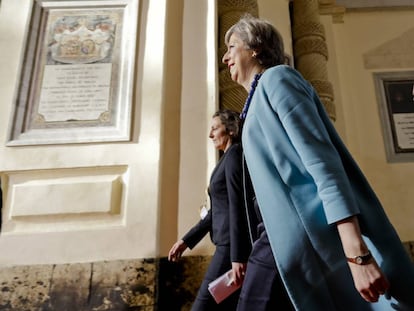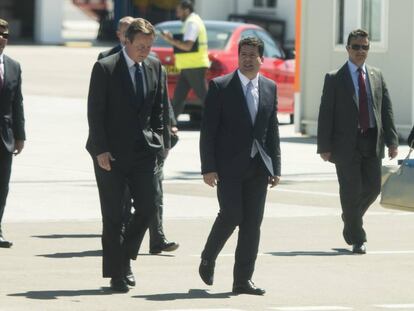Spain plays its cards in the Brexit game
Spanish companies could recover human capital that emigrated to Britain during the crisis

Now that Brexit is unavoidable for Britain, the time has come to strengthen the relationship between Spain and the United Kingdom, to address the complex challenges of an unprecedented process full of unknowns, and to make the most of any opportunities that might arise.

These were some of the conclusions at La oportunidad del Brexit (The opportunity of Brexit), a business breakfast on Monday morning organized by EL PAÍS and Sabadell Bank that brought together business, political and media leaders to discuss the repercussions of Britain’s upcoming exit from the European Union.
The group of experts agreed that the negotiations between Britain and the EU should not be punitive. First, because this “could put both parties’ growth at risk,” said Sabadell CEO Jaime Guardiola, adding that the circumstances demand an active role by the Spanish authorities and businesses alike to ensure that the new framework for relations is the best possible one.
Our diplomacy is not doing much, despite the enormous interests at stake
León Fernando del Canto, lawyer
And secondly, because Europe has no desire to create confrontation during negotiations, said Javier Solana, a former Spanish cabinet minister who later served as NATO chief and the EU’s High Representative for Common Foreign and Security Policy.
Besides, as former Spanish ambassador to Britain Carles Casajuana pointed out: “It won’t be necessary: they are already punishing themselves with the decision to leave the EU. We are all losing out here.”
The event was also attended by Andy Mackay, director of British Council Spain; Antonio Vázquez, chairman of IAG, the parent company of British Airways and Iberia; León Fernando del Canto, from London-based law firm Del Canto Chambers; Christopher Dottie, head of the British Chamber of Commerce in Spain, and EL PAÍS senior executives José Manuel Calvo and Javier Ayuso.
Strong ties
The economic ties between both countries are more than enough reason for Spain to adopt an active role in the negotiations over future relations with the United Kingdom. Britain is the primary destination for Spanish foreign investment, making up 17% of the total. Every year around 15 million British tourists visit Spain, contributing around €13 billion to the Spanish economy.
Spain is the EU’s third largest investor in Britain, behind France and Germany. Nearly one million Britons own property in Spain, and around half of those are permanent residents. At the same time, nearly 300,000 Spaniards live in Britain.
A “total” break
As Britain and Europe enter uncharted waters to negotiate an exit from the EU and a new framework for relations, UK Prime Minister Theresa May has opted for a complete break with the single market, rather than a middle-of-the-road solution, noted Solana.
“We need to negotiate from that perspective,” said Solana, who currently presides the Center for Global Economics and Geopolitics at the Esade business school. “First you need to undo the membership, and then negotiate a new agreement. And that is tremendously complex.”
Solana, who has personal experience as a negotiator, expressed his regret that the Spanish government lacks a team of people with a background in this kind of process, and asked the executive to call back the individuals who participated in Spain’s own EU membership process.
León Fernando del Canto said that new opportunities are arising in the services sector, as companies seek out professional advice on how to uncouple from Europe or how to incorporate EU legislation into their own activities.
Christopher Dottie noted that talented Spaniards working in the UK could be persuaded to come back if things get tougher there.
“If young Spaniards have fewer opportunities in Britain, Spanish companies should make an effort to attract them back,” he said.
The fact that Britain is going to leave the single market is making some companies consider the option of having a second base on the continent, and “Spain should make sure that it remains attractive in that sense,” said Dottie.
This search for new locations by British firms is most obvious in the financial sector, given the importance of the City both at the European level and for the global financial system.
To Jaime Guardiola, dismantling London’s financial center would create a global productivity problem that would create hurdles to access to funding by capital markets.
“Yet there are parts of the system that will unquestionably leave London,” he added, alluding to institutions like the European Banking Authority (EBA).
Spain is also in the running to become the headquarters for the European Medicines Agency, “which Barcelona already bid for in its day, and which could also serve as a tool for the Spanish government in its attempt to extend a hand to Catalan society.”
Not so fast
But not everyone at the breakfast was equally optimistic about the business opportunities created by Brexit.
“I am not very optimistic about it,” admitted Antonio Vázquez, of IAG. “Although perhaps the right environment is being created to eliminate unnecessary regulation in the European Union.”
If so, he said, this would increase the eurozone’s growth potential and its companies’ ability to compete. Vázquez also asked for a greater Spanish presence at the negotiating table to ensure that Spanish companies are well positioned.
Del Canto agreed. “Our diplomats are not doing much. Spain is not getting near the negotiations, despite the enormous interests at stake – not even as a lobby,” he said.
“You cannot play a leading role if you are not on the front lines,” added Dottie. “This is not just a negotiation between Britain and the European Union. Each country needs to mobilize and underscore what it is that it cannot afford to lose in this process.”
English version by Susana Urra.










































